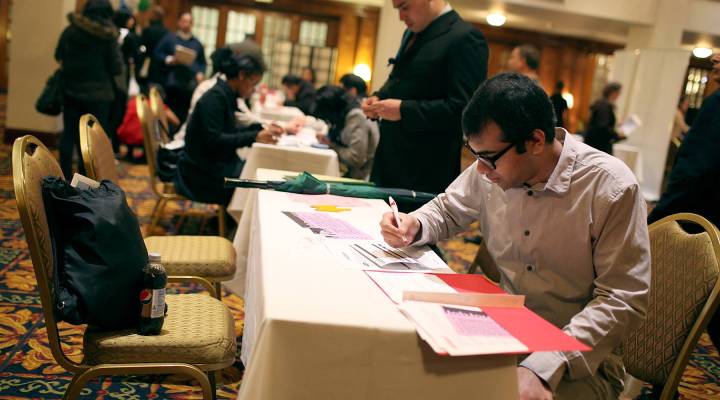
120,000 jobs added in March
Share Now on:
120,000 jobs added in March

Stacey Vanek Smith: 120,000 people were hired in the U.S. last month. That’s according to numbers out just a few minutes ago from the Labor Department. That was roughly half of what economists had expected, and a significant slowdown compared to the last few months.
Jobs are often seen as the most important gauge of the economic recovery. Gus Faucher is a senior economist with the PNC Financial Services Group. He joins me live now to give us some context. Good morning, Gus.
Gus Faucher:Good morning.
Vanek Smith: Are these numbers as bleak as they seem?
Faucher: Well certainly, 120,000 jobs is a disappointment; we were expecting something closer to 200,000. However, if you take the average over the past three months, job growth is averaging more than 200,000 a month, and I think that this is just likely to be a one-month slowdown. I don’t think it’s going to persist.
Vanek Smith: Also, if you wouldn’t mind breaking this down for us a little bit: Which industries were adding jobs, which were the weakest?
Faucher: Manufacturing employment was up by 37,000 for the month, which is certainly good news. We saw continued job gains in health care, financial services, food services, professional and business services. Then we did see a big drop of about 34,000 in retail trade in March — it could be that some of the good weather earlier in the spring pushed up hiring in retail in February and then it fell again in March. And then we saw small job losses in construction as well.
Vanek Smith: Now, the unemployment rate did fall another tenth of a percent, we’re at 8.2 percent unemployment now. Is there some silver lining there?
Faucher: To be honest with you, I’m a little disappointed. The unemployment rate fell, but it fell because there were fewer people looking for work in March. The labor force actually contracted. The household survey — which is a different survey from the payroll survey — employment in the household survey actually declined a bit. So the unemployment rate fell because there were fewer people looking for work, not more people getting jobs. And so to that extent, the decline in the unemployment rate is actually a disappointment.
Vanek Smith: Gus Faucher is a senior economist with the PNC Financial Services Group. Gus, thank you.
Faucher: Thank you.
There’s a lot happening in the world. Through it all, Marketplace is here for you.
You rely on Marketplace to break down the world’s events and tell you how it affects you in a fact-based, approachable way. We rely on your financial support to keep making that possible.
Your donation today powers the independent journalism that you rely on. For just $5/month, you can help sustain Marketplace so we can keep reporting on the things that matter to you.


















